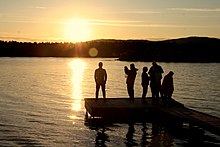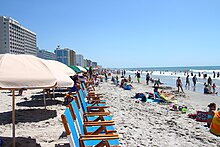Winter to Summer No Spring Funny Picture
| Temperate flavor | |
|---|---|
 Summer in Kingdom of belgium | |
| Northern temperate zone | |
| Astronomical flavour | 21 June – 23 September |
| Meteorological flavour | 1 June – 31 August |
| Solar (Celtic) flavour | 1 May – 31 July |
| Southern temperate zone | |
| Astronomical season | 22 December – 21 March |
| Meteorological flavor | 1 Dec – 28/29 February |
| Solar (Celtic) season | 1 November – 31 Jan |
| Summertime Spring Winter | |
Summer is the hottest of the four temperate seasons, occurring subsequently spring and before autumn. At or centred on the summertime solstice, the earliest sunrise and latest sunset occurs, daylight hours are longest and dark hours are shortest, with day length decreasing as the season progresses after the solstice. The date of the get-go of summer varies co-ordinate to climate, tradition, and culture. When it is summertime in the Northern Hemisphere, it is winter in the Southern Hemisphere, and vice versa.
Timing
From an astronomical view, the equinoxes and solstices would be the middle of the respective seasons,[ane] [2] but sometimes astronomical summer is divers every bit starting at the solstice, the time of maximal insolation, frequently identified with the 21st 24-hour interval of June or December. By solar reckoning, summertime instead starts on May Day and the summer solstice is Midsummer. A variable seasonal lag ways that the meteorological heart of the season, which is based on average temperature patterns, occurs several weeks later the time of maximal insolation.[3]
The meteorological convention is to define summer as comprising the months of June, July, and August in the northern hemisphere and the months of December, Jan, and Feb in the southern hemisphere.[4] [5] Under meteorological definitions, all seasons are arbitrarily gear up to showtime at the commencement of a calendar month and terminate at the end of a month.[4] This meteorological definition of summer also aligns with the commonly viewed notion of summer as the season with the longest (and warmest) days of the year, in which daylight predominates.
The meteorological reckoning of seasons is used in countries including Australia, New Zealand, Austria, Denmark, Russian federation and Nihon. It is besides used by many people in the Britain and Canada. In Ireland, the summertime months according to the national meteorological service, Met Éireann, are June, July and Baronial. By the Irish Calendar, summer begins on ane May and ends on 1 August. School textbooks in Ireland follow the cultural norm of summer commencing on 1 May rather than the meteorological definition of 1 June.

Days keep to lengthen from equinox to solstice and summer days progressively shorten after the solstice, so meteorological summer encompasses the build-up to the longest twenty-four hours and a diminishing thereafter, with summer having many more hours of daylight than spring. Reckoning by hours of daylight alone, summer solstice marks the midpoint, non the beginning, of the seasons. Midsummer takes place over the shortest night of the yr, which is the summer solstice, or on a nearby date that varies with tradition.
Where a seasonal lag of half a flavour or more is common, reckoning based on astronomical markers is shifted half a season.[six] By this method, in North America, summer is the period from the summer solstice (usually 20 or 21 June in the Northern Hemisphere) to the autumn equinox.[7] [eight] [9]
Reckoning by cultural festivals, the summer season in the The states is traditionally regarded as beginning on Memorial Day weekend (the last weekend in May) and ending on Labor Twenty-four hour period (the first Mon in September), more closely in line with the meteorological definition for the parts of the country that accept four-season atmospheric condition. The like Canadian tradition starts summer on Victoria Mean solar day 1 week prior (although summer conditions vary widely across Canada's expansive territory) and ends, as in the The states, on Labour Mean solar day.
In some Southern Hemisphere countries such every bit Brazil, Argentine republic, South Africa, Commonwealth of australia and New Zealand, summer is associated with the Christmas and New year holidays. Many families take extended holidays for two or 3 weeks or longer during summer.
In Chinese astronomy, summer starts on or around five May, with the jiéqì (solar term) known as lìxià (立夏), i.e. "establishment of summer", and information technology ends on or effectually 6 August.
In southern and southeast Asia, where the monsoon occurs, summertime is more generally defined as lasting from March, April, May and June, the warmest fourth dimension of the year, ending with the onset of the monsoon rains.[ citation needed ]
Because the temperature lag is shorter in the oceanic temperate southern hemisphere,[10] most countries in this region use the meteorological definition with summer starting on one December and ending on the last day of February.[11] [12]
Atmospheric condition

Summertime is traditionally associated with hot or warm weather. In Mediterranean climates, it is also associated with dry weather, while in other places (particularly in Eastern asia because of the monsoon) it is associated with rainy weather. The wet season is the main menstruum of vegetation growth within the savanna climate authorities.[13] Where the moisture season is associated with a seasonal shift in the prevailing winds, it is known as a monsoon.[14]

In the northern Atlantic Body of water, a distinct tropical cyclone season occurs from 1 June to xxx Nov.[15] The statistical peak of the Atlantic hurricane season is 10 September. The Northeast Pacific Body of water has a broader menstruum of activity, but in a similar timeframe to the Atlantic.[16] The Northwest Pacific sees tropical cyclones twelvemonth-round, with a minimum in February and March and a peak in early September. In the North Indian basin, storms are near common from April to December, with peaks in May and November.[15] In the Southern Hemisphere, the tropical whirlwind season runs from the start of November until the end of April with peaks in mid-February to early March.[15] [17]
Thunderstorm season in the United States and Canada runs in the spring through summertime but sometimes tin run as late as Oct or even November in the fall. These storms tin produce hail, strong winds and tornadoes, unremarkably during the afternoon and evening.
Holidays
School breaks
Schools and universities typically have a summer interruption to accept advantage of the warmer weather condition and longer days. In almost all countries, children are out of school during this time of year for summertime break, although dates vary. Many families will take holidays for a calendar week or two over summer, specially in Southern Hemisphere Western countries with statutory Christmas and New year holidays.
In the United States, public schools normally end in late May in Memorial Twenty-four hour period weekend, while colleges end in early May. Public school traditionally resumes about Labor Solar day, while higher institutions oft resume in mid-August.
In England and Wales, school ends in mid-July and resumes again in early September. In Scotland, the summertime holiday begins in late June and ends in mid-to late-Baronial. Similarly, in Canada the summertime holiday starts on the last or second-concluding Friday in June and ends in late August or on the commencement Tuesday of September, with the exception of when that date falls before Labour Mean solar day, in which instance, ends on the 2nd Tuesday of the calendar month. In Russia the summer vacation begins at the cease of May and ends on 31 August.
In the Southern Hemisphere, school summer holiday dates include the major holidays of Christmas and New year'south Day. School summertime holidays in Australia, New Zealand and Due south Africa begin in early December and terminate in early on February, with dates varying between states. In South Africa, the new school year commonly starts during the second week of January, thus adjustment the academic yr with the Calendar year. In India, school ends in belatedly April and resumes in early on or mid-June. In Cameroon and Nigeria, schools usually finish for summer vacation in mid-July and resume in the after weeks of September or the first week of October.
Public holidays
A wide range of public holidays autumn during summer, including:
- Northern Hemisphere
- Bank holidays in the United kingdom and Republic of ireland
- Bastille Day, National Day of France (14 July)
- Belgian National Day (21 July)
- Canada Day (ane July)
- Festa della Repubblica, Italian national 24-hour interval and republic day (2 June)
- Independence Day (Jordan) (25 May)
- Independence Twenty-four hour period (Pakistan) (14 Baronial)
- Independence 24-hour interval (Republic of india) (15 August)
- Independence Day (United States) (4 July)
- Juneteenth (U.s.a.) (19 June)
- Memorial Mean solar day (United States) or Victoria Day (Canada) through Labor Day
- National Day of Sweden (vi June) and Midsummer, sometimes referred to every bit the "alternative National 24-hour interval"
- Ólavsøka, Faroe Islands (29 July)
- Swiss National Day (1 August)
- Victory Day (Turkey) (30 Baronial)
- Southern Hemisphere
- Australia Solar day (26 January)
- Christmas Solar day (25 December) and Boxing Twenty-four hours (26 December) in many countries
- New year's day's Mean solar day (1 January) and the following day (2 January) in many countries
- Waitangi 24-hour interval (6 February) In New Zealand
Activities

People generally take reward of the high temperatures by spending more fourth dimension outdoors during summer. Activities such as travelling to the embankment and picnics occur during the summertime months. Sports including cricket, association football (soccer), horse racing, basketball, American football, volleyball, skateboarding, baseball, softball, lawn tennis and golf are played.
Water sports also occur. These include h2o skiing, wakeboarding, swimming, surfing, tubing and water polo. The modern Olympics have been held during the summer months every four years since 1896. The 2000 Summer Olympics, in Sydney, were held in spring and the 2016 Summer Olympics, in Rio de Janeiro, were held in wintertime.
In the United States, many television shows made for children are released during the summer, as children are off school.
Conversely, the music and picture show industries generally experience higher returns during the summer than other times of the year and market their summer hits accordingly. Summertime is pop for animated movies to be released theatrically in picture theaters.[ citation needed ]
With many schools closed, specially in Western countries, travel and vacationing tend to peak during the summer. Teenagers and university students often accept summer jobs, and business activeness for the recreation, tourism, restaurant, and retail industries achieve their peak.
-

Children cycling during summer
-

-

Using a handheld fan in summertime
See too
- Summertime Olympic Games
- Summer War
References
| | Wikiquote has quotations related to Summer . |
| | Look upwardly summer in Wiktionary, the free lexicon. |
| | Wikimedia Commons has media related to Summer. |
- ^ Ball, Sir Robert South (1900). Elements of Astronomy. London: The MacMillan Company. p. 52. ISBN978-i-4400-5323-8.
- ^ Heck, Andre (2006). Organizations and strategies in Astronomy. Vol. 7. Springer. p. xiv. ISBN978-1-4020-5300-ix.
- ^ Cecil Adams (xi March 1983). "Is it true summer in Republic of ireland starts May ane?". The Straight Dope. Archived from the original on 30 Baronial 2011. Retrieved 27 September 2011.
- ^ a b Meteorological Glossary. London: HMSO. 1991. p. 260. ISBN978-0-xi-400363-0.
- ^ "Professor Paul Hardaker answers questions on meteorological forecasting" Archived 2 February 2017 at the Wayback Automobile. Regal Geographical Society.
- ^ Driscol, D. M.; Rice, P. B.; Fong, J. Grand. Y. (1994). "Spatial variation of climatic aspects of temperature: Interdiurnal variability and lag". International Journal of Climatology. 14 (ix): 1001. Bibcode:1994IJCli..14.1001D. doi:ten.1002/joc.3370140905.
- ^ "First 24-hour interval of summertime worth celebrating". JSOnline. Archived from the original on 13 July 2011. Retrieved 27 September 2011.
- ^ "Father'south Mean solar day is first day of summer". Fox11online.com. xix June 2009. Archived from the original on 17 September 2011. Retrieved 27 September 2011.
- ^ "Summer Solstice". Eric Weisstein's World of Astronomy. Scienceworld.wolfram.com. Retrieved 27 September 2011.
- ^ Gabler, Robert Due east.; Petersen, James F.; Trapasso, L. Michael; Sack, Dorothy (2008). Physical Geography. Belmont, California: Cengage Learning. p. 107. ISBN0495555061.
- ^ Williams, Jack (22 February 2005). "Answers: When do the seasons begin". Usatoday.Com. Archived from the original on 27 January 2012. Retrieved 27 September 2011.
- ^ "Bureau of Meteorology". Bom.gov.au. 11 March 2011. Archived from the original on 12 September 2017. Retrieved 27 September 2011.
- ^ Charles Darwin University (2009). Characteristics of tropical savannas. Archived 17 February 2009 at the Wayback Machine Charles Darwin University. Retrieved on 27 December 2008.
- ^ Glossary of Meteorology (2009). Monsoon. Archived 22 March 2008 at the Wayback Machine American Meteorological Society. Retrieved 16 January 2009.
- ^ a b c Atlantic Oceanographic and Meteorological Laboratory, Hurricane Enquiry Division. "Oft Asked Questions: When is hurricane season?". National Oceanic and Atmospheric Administration. Archived from the original on 18 July 2006. Retrieved 25 July 2014.
- ^ McAdie, Colin (10 May 2007). "Tropical Whirlwind Climatology". National Hurricane Center. Archived from the original on 6 May 2010. Retrieved 9 June 2007.
- ^ "Tropical Cyclone Operational Plan for the Southeastern Indian Ocean and the South Pacific Oceans" (PDF). Globe Meteorological Organisation. x March 2009. Archived (PDF) from the original on 25 March 2009. Retrieved 6 May 2009.
Source: https://en.wikipedia.org/wiki/Summer
0 Response to "Winter to Summer No Spring Funny Picture"
Post a Comment